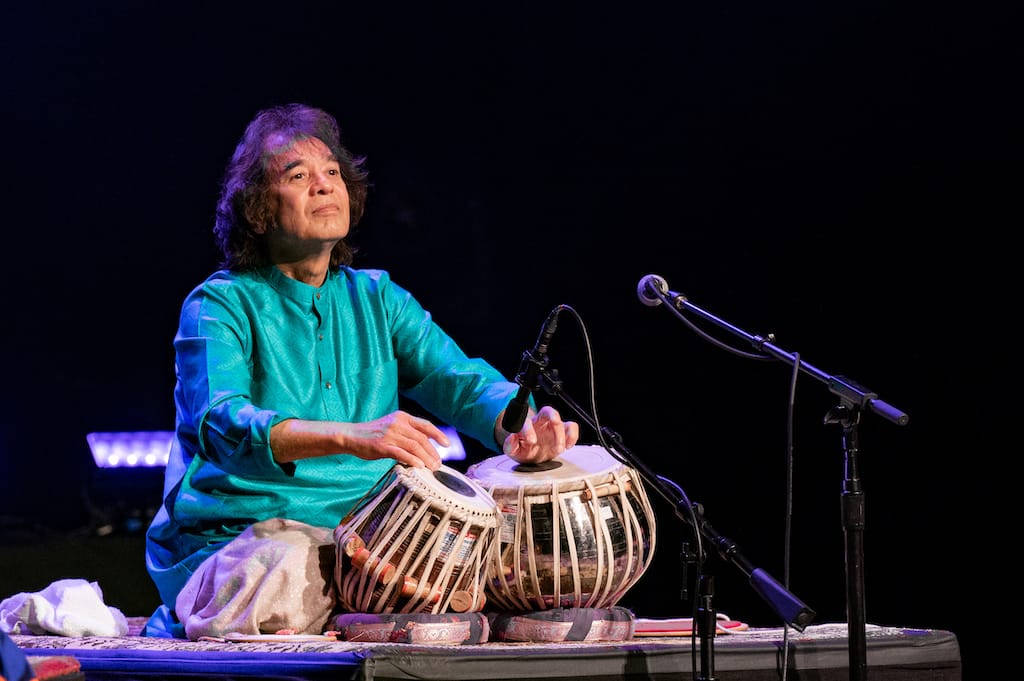Zakir Hussain (1951–2024): The World Loses a Rhythmic Genius
Zakir Hussain, legendary tabla maestro, revolutionised Indian classical music through his artistry, global collaborations, and innovation. His passing at 73 marks the end of an era, leaving behind an unparalleled legacy that transcends cultural boundaries.

Tabla maestro Zakir Hussain passed away at a hospital in San Francisco, his family announced on Monday, December 16, 2024. The iconic musician succumbed to complications arising from idiopathic pulmonary fibrosis at the age of 73. He had been hospitalized for the last two weeks and was moved to the ICU as his condition deteriorated.
Hussain’s passing marks the end of an extraordinary era in music. Known for his innovative spirit, he transformed the tabla from a traditional accompaniment instrument into a globally celebrated solo art form. His performances were a masterclass in improvisation, marked by breathtaking precision and an innate ability to connect with audiences across cultures.
Born to the legendary tabla maestro Ustad Allarakha, Zakir Hussain displayed prodigious talent from an early age, embarking on his first international tour at just 12 years old. Over the next six decades, he became a global ambassador of Indian classical music. His partnership with his father redefined perceptions of the tabla and inspired countless musicians worldwide.
Zakir Hussain’s career was marked by groundbreaking collaborations. His 1973 project with English guitarist John McLaughlin, violinist L. Shankar, and percussionist T.H. ‘Vikku’ Vinayakram birthed Shakti, a trailblazing fusion of Indian classical music and jazz that broke new ground in the world music genre. He continued to collaborate with luminaries such as Mickey Hart (Planet Drum), Yo-Yo Ma (Silk Road Ensemble), and Charles Lloyd, always pushing boundaries and expanding the possibilities of his instrument.
Earlier this year, at the 66th Grammy Awards, Zakir Hussain received three Grammy Awards, bringing his career total to four. His 1991 collaboration Planet Drum with Mickey Hart also won the first-ever Grammy for Best World Music Album. These accolades underscore his exceptional artistry and global appeal.
A prolific composer, Hussain’s work extended into film, dance, and orchestral music. He composed scores for renowned productions like Heat and Dust and In Custody, as well as for Alonzo King’s Lines Ballet. His tabla concerto, premiered by the Symphony Orchestra of India, highlighted his dedication to evolving the role of the tabla within classical and contemporary music.
In addition to his artistic achievements, Hussain was a dedicated teacher and mentor. He inspired generations of musicians through his workshops, residencies, and the founding of Moment! Records, which is devoted to preserving and promoting Indian music traditions. He was also deeply committed to cultural exchange, as evident in his work with the Indo-American Arts Council and other organizations.
Throughout his career, Zakir Hussain received numerous prestigious honours, including the Padma Bhushan, Padma Vibhushan, and the Sangeet Natak Akademi Fellowship. In 2022, he was awarded the Kyoto Prize in Arts and Philosophy, one of the world’s highest honours in the arts.
Hussain’s passing is a profound loss to the music world, but his legacy endures through his recordings, collaborations, and the countless students he inspired. As he once said, “Music is a universal language that has the power to bring people together.” Indeed, his rhythms will continue to echo across the globe, uniting hearts and inspiring future generations.





